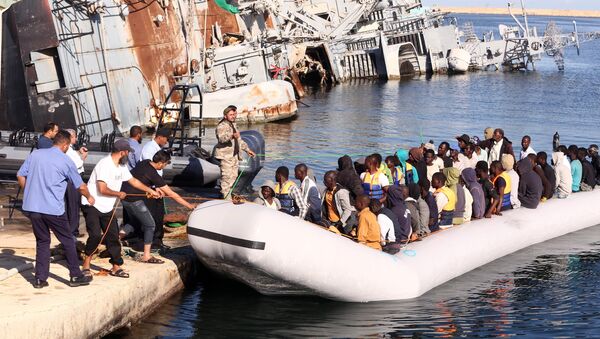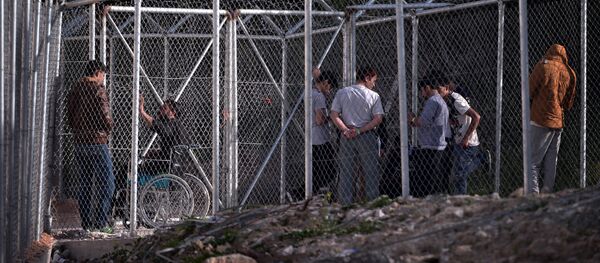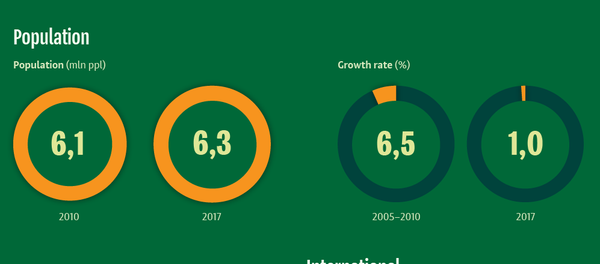Under pressure from the migrant flows, the EU has supported the Libyan coastguard in its efforts to intercept boats smuggling migrants into Europe. While this has led to a large reduction in migrant arrivals in Italy, a recent report by human rights watchdog Amnesty International claims that migrants in the Libyan detention centers are subject to torture, forced labor, rape, and other forms of abuse. The report further claims that the Libyan coast guard is also working with criminal gangs and smugglers, adding further criticism to the EU's cooperation with the Libyan coast guard.
READ MORE: EU, African Leaders Unite to Combat Human Trafficking in Libya
In order to resolve the current crisis, some specialists contend that better solutions need to be found.
"We need legal alternatives so that the boat smugglers are not the only alternative around. We need legal quotas for migrants so there are possibilities to go directly from your home country to a country in Europe, such as for a limited-time period to work," Pal Nesse, senior advisor for the Norwegian Refugee Council told Radio Sputnik in an interview.
"We think we need legal alternatives for migrants, but we also accept the notion that if you don't need protection, then it is acceptable for countries to return you to your home country, also if you don't want to yourself," Nesse added.
READ MORE: 'Roasted Like Kebabs, Organs Harvested': Fate of Nigerian Migrants in Libya
When presented with the possible abandonment of the EU's mandatory migrant quota scheme at the behest of Hungary, Poland and the Czech Republic, Nesse said that while he hopes they will get on board, the rest of Europe is still capable of handling this without them. For Nesse, the key issue is to find the ‘political will'.
"It very often comes back to having the political will to acknowledge the situation, to do something about it, because the numbers are not so big. Europe is not being invaded by migrants and by refugees," Nesse concluded.
Puilly says that the UNHCR is working to tackle the problem ‘upstream', explaining to people that in order to find protection they do not need to make the dangerous journey to Europe.
"First, what we are trying to do is to work upstream, which means that the people who need international protection don't have to risk their lives during a perilous journey to find this protection. So we're trying to beef up first countries of asylum," Puilly told Radio Sputnik.
She also added that it is critical to address what she sees as the root of the problem: poverty and the lack of development of some regions.
While unwilling to comment directly on the prospect of the EU scrapping its mandatory migrant quota scheme, Puilly stressed that it is critical for Europe to adopt more permanent procedures to help with the resettlement of refugees, and to continue efforts to relieve some of the pressure placed on EU border states such as Italy and Greece.
READ MORE: Slave Trade in Libya: Who Controls the Human Trafficking Market in Tripoli?
Addressing the immediate problem of refugees who are stranded in Libya, Puilly again underscored the need to increase the legal avenues for evacuating and resettling them elsewhere.
"For this to happen, we need to offer credible alternatives to people, which means increasing the number of resettlement places, opportunities for family reunifications, humanitarian visas, and the rest," suggested Puilly.
In 2011 Libya plunged into civil war; its longtime leader Muammar Gaddafi was toppled and killed in the wake of a NATO-led intervention. As it stands now, Libya remains divided into different zones, and practically no longer exists as a unified state.
International efforts to resolve the conflict have resulted in the Tripoli-based Government of National Accord (GNA) led by Fayez Sarraj, who assumed the position of Prime Minister in early 2016. However, much of the country remains under the control of the elected parliament, and is supported by the Libyan National Army (LNA). Based in the eastern coastal city of Tobruk, the LNA is commanded by Field Marshal Khalifa Haftar, who does not recognize the legitimacy of the GNA.
In 2015, Europe adopted a 10-point action plan. It called for the EU to reinforce its joint operations in the Mediterranean financially and geographically, and also called for extra measures to be taken against smugglers and for the processing of asylum applications to be improved. The plan also, controversially, stipulates the fingerprinting of migrants, emergency relocation mechanisms, and also cooperation with the Libyan authorities.
The views and opinions expressed by Pal Nesse and Cécile Puilly are those of the specialists and do not necessarily reflect those of Sputnik.







